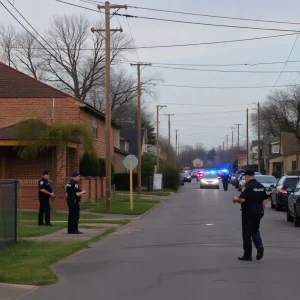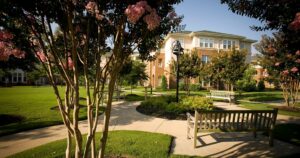Tension in a Northeast Memphis Neighborhood Raises Safety Concerns
Nashville isn’t the only place in Tennessee dealing with community unrest; Memphis is facing its own unique challenges. In a neighborhood off Macon Road, a couple is expressing their growing frustration regarding safety issues stemming from a nearby group home. David Lewis, a resident there, has become increasingly worried about the vandalism and harassment linked to the home that accommodates individuals with behavioral challenges.
As David Lewis puts it, “I was just getting out of the shower when my wife started screaming.” Those screams were a response to the glass shattering as someone from across the street, a resident of the group home, broke a window. For Lewis and his neighbors, incidents like this are becoming all too familiar. “My flower pots and garbage cans are flipped over daily,” he adds, highlighting the constant disturbances that have invaded their previously peaceful lives.
It’s not just the property damage that’s worrisome. Lewis recalls a particularly unsettling incident involving his grandchildren. “We had just gotten out of our car when one of the residents came screaming across our yard,” he said, “accusing my grandson of calling him a name, but my grandson hadn’t even spoken to him.” These confrontations not only heighten tensions in the neighborhood but also make residents feel unsafe, especially within the confines of their own homes.
In an effort to shed light on the situation, Lewis has been vocal about the need for more oversight when it comes to such group homes. “This community has many older people living in it,” he points out. His concerns are echoed by others in the area, who fear for the vulnerability of both the residents in the home and their neighbors. “If they are going to keep them here, there needs to be a way to manage those who cause trouble and destruction,” he explains.
The group home in question is operated by Capital City Residential Health, which leases homes to organizations aimed at empowering individuals with disabilities to live independently. Earle Schwartz, who runs the Housing Foundation of West Tennessee and oversees these facilities, acknowledges the challenges but emphasizes their mission. “All types of folks with intellectual disabilities live in our homes. Some are designed for people in wheelchairs, while others serve different needs,” Schwartz explains. “We provide the house, and someone else takes care of the staff.”
Despite Schwartz’s commitment to the cause, neighbors like Lewis remain apprehensive. They’re concerned that the lack of control over some residents can lead to persistent disturbances. The peaceful vibe of the neighborhood seems to be slipping away, and residents can’t help but feel that they’re in a precarious situation with little support.
This isn’t merely a case of one couple’s complaints; there has been an ongoing dialogue in the community about maintaining safety standards and ensuring that vulnerable populations are also kept safe. As neighborhoods evolve and facilities intended to provide care and support move in, the results can be a mixed bag, with some residents thriving and others posing risks. The divide between those who need support and their neighbors can grow intense.
Determining the balance between helping individuals with disabilities and keeping the neighborhood safe is a complex issue that many communities face nationwide. It requires engagement from various stakeholders, including local authorities, nonprofit organizations, and, importantly, community members who live in proximity to such facilities.
The challenges don’t simply stem from the physical proximity of these homes; they often reach into the emotional well-being of residents. “It just feels like we aren’t comfortable in our own home,” Lewis adds, summarizing the emotional toll the situation has taken on him and his wife.
While the local authorities have been contacted about the ongoing issues, solutions often take time. Community meetings are essential, and maintaining dialogue is beneficial, but immediate actions and accountability need to be emphasized. Residents hope for changes that will ensure that all individuals, regardless of their backgrounds, can find safety and support within a fostering environment.
As tensions continue to rise in this Northeast Memphis community, residents must strive for a balance—a way to ensure their neighborhood remains peaceful while still supporting those in need. How and when this balance is achieved remains to be seen, but for now, the conflict continues to loom large in the lives of those affected.
Neighbors like Lewis are understandably concerned, and frankly, they deserve to feel secure in their own homes. It’s a reminder of the challenges cities across the country face: the delicate act of nurturing vulnerable populations while upholding community safety.








